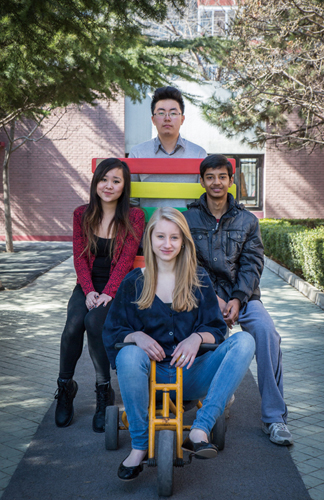
Clockwise from top:
- Jiexi Zhao, China, 15 years old, has lived in Beijing for 15 years
- Vishagya Saxena, India, 15 years old, has lived in Beijing for six months
- Marlena Gailis, Latvia, 15 years old, has lived in Beijing for 9 months
- Sophia Fang, US, 16 years old, has lived in Beijing for four years
Money: some have it, many don’t. It’s one of the touchiest subjects in politics and relationships alike, but almost everyone would like to have more of it. The world’s rich-poor gap has grown ever-bigger, which means funding social infrastructure – and who will provide that funding – isn’t a simple problem anymore. We spoke to four students at Beijing BISS International School for their thoughts on the rich, the poor, and what’s fair.
What are your thoughts about people on the street asking for money?
Vishagya: They’re doing it for money or for their livelihood.
Sophia: Because China’s such a fast-growing economy, the gap is going to grow between the poor and rich classes. It’s inevitable that there are going to be people that get the shorter end of the stick.
Marlena: There will always be people asking for money; there’s nothing you can do about it.
Do you feel differently about musicians who play music and people who just ask for money?
Jiexi: Yes. They’re giving something and you give them money as payment. There are people who are professional beggars, and they can earn millions of RMB each year.
Marlena: I think musicians aren’t really asking for money, it’s more of a donation; you’re basically thanking them for what they’re doing.
Do you ever give money to people on the street?
Marlena: Not really on the street. I don’t see a lot of the locals giving money.
Jiexi: There’s a rule that in the subway that you can’t give beggars money; it’s illegal. It’s [posted]on the subway [walls].
Sophia: When I first came to China, I gave money to a beggar. I was with my friend, who only had hundreds. After I gave money, the beggar started hassling my friend, holding onto him and not letting go until he gave him money too. Ever since then, I’ve never given money.
Vishagya: I don’t give money to beggars, because in India there are child beggars. [Dealers] steal children and force them to earn money by going on the roads to beg. The money goes to the dealers.
If you had to choose one way, what is the best way (food, money, clothes) to help impoverished people?
Marlena: Most of the time, that money goes to alcohol, drugs or cigarettes, so I think that maybe food and clothing are the most important.
Vishagya: There are some kids who don’t want food or education; they don’t want anything but money.
Jiexi: I think the best way is to give them a job, as a worker or cleaner, so they can make money to get food, and pay their taxes.
Sophia: I don’t believe we should be giving food and clothing, because then they’ll have less motivation to join the workforce. I think the best way is [through]a re-education program, halfway houses or something like that.
Should wealthier people pay higher taxes?
Jiexi: The more you earn, the more you pay.
Vishagya: India is a democratic country. Everyone is equal before the law, so it’s not about rich men and poor men; they all have to give taxes.
Sophia: I do believe in percentage taxes, but I don’t believe the richer should be taxed significantly more, because they’re the job creators and there needs to be a reward for contributing.
How should governments support the poor or unemployed?
Sophia: I think they should spend more money providing scholarships to public colleges or creating schooling for the impoverished.
Marlena: Giving education, helping them get a job, giving them an education about how you can get a job, or what questions someone might be asking you in a job interview.
What do you think about welfare or unemployment payments?
Sophia: It’s a good thing to motivate people to get back into the labor force by cutting back on unemployment benefits. It gives them more incentive to work.
Jiexi: I don’t think it’s possible for China; there are too many people.
Vishagya: In Qatar and Dubai, they give money to people, and they don’t take taxes. But in countries like China and India, there are so many people, [so]it’s not easy to give money to everyone. In the end, there are so many scams, and the officials will keep the money.
Marlena: I think it depends on the country’s population. Latvia is a small country, so it’s not that hard for the government to give welfare.
Should wealthy people be obligated to donate money to charity?
Sophia: No. If wealthy people had to give back their wealth to the poor, it would defeat the whole purpose of people working.
Vishagya: If rich people give money to beggars or poor people, there will be no difference between them and the rich.
Marlena: I don’t think they’re obligated at all. They’re earning their money; everyone should be earning their own money and supporting their own family. Sophia: They have to take it as their own moral duty to ease their own conscience.
Jiexi: I agree, but we can find a way. For example, through taxes. With a salary above RMB 600,000 per month, you can donate a percent of taxes to the government, and then the government will donate to the poor.
Should wealthier nations be obligated to give aid to poorer nations?
Marlena: If [the richer country is]willing and has the resources, then they can help. But it’s not something they have to do.
Jiexi: A lot of poor countries don’t have electricity and technology, so we can trade money for the resources still [available]in those countries.
Sophia: I believe that international trade is the best way to help impoverished countries. But in Africa they’re making less money for exports because they’re only exporting raw materials. So if other countries invested money in building factories or formed companies in those countries to [produce these]products, the economies would be stimulated.
Vishagya: If one country faces a natural calamity and another country wants to give money, then that would be fair.
Photo by Mitchell Pe Masilun



